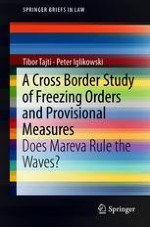
2018 | OriginalPaper | Buchkapitel
1. Introduction
verfasst von : Tibor Tajti, Peter Iglikowski
Erschienen in: A Cross Border Study of Freezing Orders and Provisional Measures
Aktivieren Sie unsere intelligente Suche, um passende Fachinhalte oder Patente zu finden.
Wählen Sie Textabschnitte aus um mit Künstlicher Intelligenz passenden Patente zu finden. powered by
Markieren Sie Textabschnitte, um KI-gestützt weitere passende Inhalte zu finden. powered by